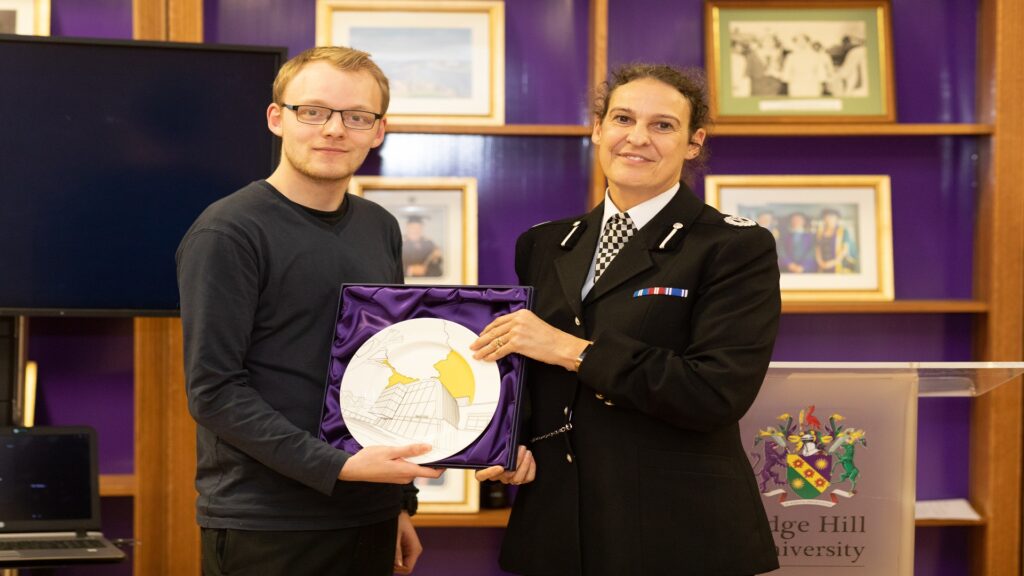Policing and Law Enforcement Investigation MSc
Get to know the investigation process with insights from former senior police officers. Studying with us, you’ll master the strategies used by the police and other law enforcement agencies to investigate serious and complex cases.
Overview
| Course length: | 1 year full-time 2 years part-time |
|---|---|
| Start dates: | September 2024 September 2025 |
| Location: | Edge Hill University |
| Subject(s): | Policing |
| Faculty: | Arts and Sciences |
| Department: | Law, Criminology and Policing |

Already a police officer or member of police staff? Working within a law enforcement agency? Or keen to kickstart your career in law enforcement? We’ve designed this course for anyone who wants to take charge of investigations, perform lead roles in intelligence and play a key role in tackling crime across the UK.
To prepare you for your future in investigations, we’ll focus on building the practical and theoretical skills you need. This involves exploring the strategies within investigation plans, including forensics, witnesses and scene management.
Shape your policing and law enforcement studies with opportunities to explore different areas. Choose from optional modules that include; disclosure, cybercrime – detection investigation and enforcement, public protection, vulnerability and risk, and forensic opportunities in investigation.
At the same time as boosting your expertise, you’ll develop sought-after advanced research skills. Employers will also value your other transferrable skills in communication, critical analysis, time management, teamwork and problem-solving.
Course features
-
International students can apply
What you'll study
On our MSc Policing and Law Enforcement Investigation course, you’ll explore the processes, legal requirements, policies and regulatory frameworks that apply to different stages of investigations into serious and complex cases.
We’ll discuss policing and law enforcement topics such as the management of investigations, the ethical issues and evidence based practice that apply to investigation and the use of intelligence in both reactive and proactive investigation. All of this will develop your specialist knowledge and advance your understanding of research. You can focus on specific types of investigations, or certain aspects or stages of an investigation with optional modules in semester 2. Choose from a range of areas including cybercrime, disclosure, public protection, vulnerability and risk and forensic opportunities in investigation.
Where your course includes optional modules, these are to provide an element of choice within the course curriculum. The availability of optional modules may vary from year to year and will be subject to minimum student numbers being achieved. This means that the availability of specific optional modules cannot be guaranteed. Optional module selection may also be affected by timetabling requirements. Some restrictions on optional module choice or combinations of optional modules may apply.
How you'll study
The course will be delivered through traditional face-to-face learning. You will typically attend weekly lectures and interactive seminars and a monthly online consolidation workshop.
Classes will involve a series of tutor-led elaborations and evaluations, as well as student-led engagements including the presentation of problem-solving exercises and discussion of pre-set questions.
Additional face-to-face or online student support sessions, along with access to online learning and research materials, will also be available.
How you'll be assessed
You will be assessed through a variety of coursework tasks which will include assignments, such as essays, individual or group presentations and the completion of portfolios. During the seminar sessions there will be problem-solving exercises involving case studies or hypothetical scenarios. You will be required to identify and apply the pertinent law, policy, process or regulations to a given set of facts.
Your dissertation will be 12,000 words in length and could, for example, focus on a topic involving research around an element of investigation or workplace experience (suitably anonymised). It may also be conducted in the context of an employment setting, such as a police force or law enforcement agency.
There are no formal written examinations as part of the current assessment methods on this taught Masters degree.
Who will be teaching you
Designed and delivered by ex-senior professional police officers, police staff and academics in policing and law enforcement, the course is taught by staff who have significant experience of senior roles within the police service, including chief constable, head of crime, head of professional standards and principal analyst levels.
Your learning will be underpinned by extensive professional experience and cutting-edge research into investigations and associated processes, including the management of intelligence.
Guest speakers and subject matter experts from other departments and external to the University will also contribute to delivery of the course.
Entry criteria
Entry requirements
You should have a degree equivalent to UK first-class or second-class honours (2:2 or above) in a relevant subject.
Relevant professional qualifications and/or appropriate work experience will also be considered. This will allow for the recruitment of current police officers, police staff and staff from other law enforcement agencies with significant related work experience.
For applicants who don’t have a second-class honours degree, an interview will usually form part of the selection process.
English language requirements
International students require IELTS 6.5, with a score no lower than 6.0 in each individual component, or an equivalent English language qualification.
If your current level of English is half a band, one band, or one-and-a-half bands lower, either overall or in one or two elements, you may want to consider our Pre-Sessional English course.
How to apply
This course has an online application process.
Please choose the application form for your preferred intake date and mode of study.
Please see our international student pages for further information about how to apply as a prospective international student.
Should you accept an offer of a place to study with us and formally enrol as a student, you will be subject to the provisions of the regulations, rules, codes, conditions and policies which apply to our students. These are available at www.edgehill.ac.uk/studentterms.
There’s plenty of opportunities to come take a look around campus. Attend one of our open days to see what life at Edge Hill University is all about.
Book an open day
Facilities

The £6million Law and Psychology building provides contemporary teaching and learning facilities for students in the School of Law, Criminology and Policing and the Department of Psychology.
The three-storey building includes a 250-seat lecture theatre, seminar and tutorial rooms, and social learning areas which encourage a more informal and interactive style of learning. Elsewhere on campus, there is a mooting room (a mock courtroom) and Police Training and Simulation Facility.
Where you'll study
Law and Psychology
Police Training and Simulation Facility
Learning resources
The Police Training and Simulation Facility, part of which is furbished as a police station, is used to simulate a wide range of crime scenes. This will enable Law and Policing students to work together in areas such as gathering and analysing evidence, including forensic evidence at crime scenes, as well as practicing interview techniques used by the police through role play, while also ensuring that the rights of suspects are upheld.
Finance
Tuition fees
UK Full-Time
£9,000
for the course
UK Part-Time
£50 per credit
for 180 credits
International
£16,500
for the course
EU/EEA and Swiss students who have settled or pre-settled status under the EU Settlement Scheme, as well as Irish nationals, may be eligible for the UK tuition fee rate.
Financial support
Please view the relevant Money Matters guide for comprehensive information about the financial support available to eligible UK students joining postgraduate courses at Edge Hill University.
EU/EEA and Swiss students who have settled or pre-settled status under the EU Settlement Scheme may be eligible to apply for financial support. Irish nationals can ordinarily apply to Student Universal Support Ireland (SUSI). If you are an EU student who does not have settled or pre-settled status, or are an international student from a non-EU country, please see our international student finance pages.
Your future career
To start a career in the police force, you only need an undergraduate degree. However, by completing our MSc Policing and Law Enforcement and Investigation, you’ll stand out from your competition with your advanced knowledge and research skills.
You’ll be ready for roles in the Home Office and non-Home Office police forces in the UK, as well as other law enforcement agencies, such as the National Crime Agency. There are 35 national agencies in the UK with intelligence and investigation within their remit, so you’ll find lots of opportunities in this area.
The course also provides career enhancement opportunities for serving police officers, police staff and members of other law enforcement agencies. You’ll graduate with the skills needed to manage investigations and will be well placed to secure this through either promotion or professional development.
Course changes
Every effort has been made to ensure the accuracy of this information, however our courses are subject to ongoing review and development. Changing circumstances may necessitate alteration to, or the cancellation of, courses.
Changes may be necessary to comply with the requirements of professional bodies, revisions to subject benchmarks statements, to keep courses updated and contemporary, or as a result of student feedback. We reserve the right to make variations if we consider such action to be necessary or in the best interests of students.










